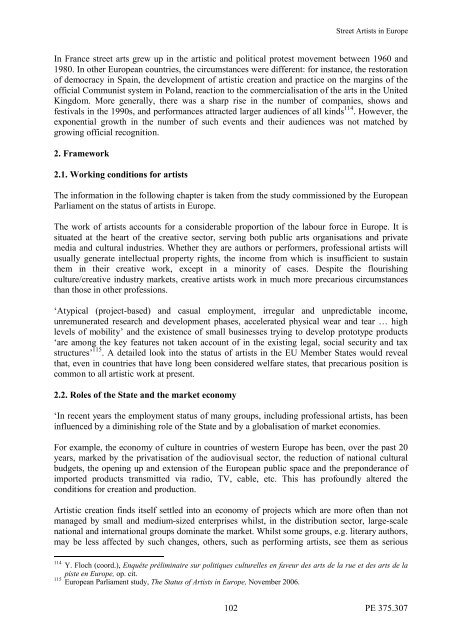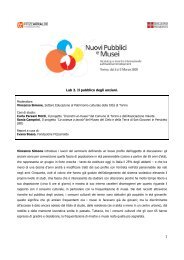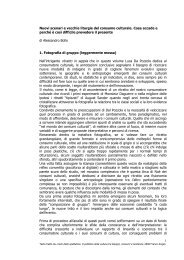STREET ARTISTS IN EUROPE - Fondazione Fitzcarraldo
STREET ARTISTS IN EUROPE - Fondazione Fitzcarraldo
STREET ARTISTS IN EUROPE - Fondazione Fitzcarraldo
You also want an ePaper? Increase the reach of your titles
YUMPU automatically turns print PDFs into web optimized ePapers that Google loves.
102<br />
Street Artists in Europe<br />
In France street arts grew up in the artistic and political protest movement between 1960 and<br />
1980. In other European countries, the circumstances were different: for instance, the restoration<br />
of democracy in Spain, the development of artistic creation and practice on the margins of the<br />
official Communist system in Poland, reaction to the commercialisation of the arts in the United<br />
Kingdom. More generally, there was a sharp rise in the number of companies, shows and<br />
festivals in the 1990s, and performances attracted larger audiences of all kinds 114 . However, the<br />
exponential growth in the number of such events and their audiences was not matched by<br />
growing official recognition.<br />
2. Framework<br />
2.1. Working conditions for artists<br />
The information in the following chapter is taken from the study commissioned by the European<br />
Parliament on the status of artists in Europe.<br />
The work of artists accounts for a considerable proportion of the labour force in Europe. It is<br />
situated at the heart of the creative sector, serving both public arts organisations and private<br />
media and cultural industries. Whether they are authors or performers, professional artists will<br />
usually generate intellectual property rights, the income from which is insufficient to sustain<br />
them in their creative work, except in a minority of cases. Despite the flourishing<br />
culture/creative industry markets, creative artists work in much more precarious circumstances<br />
than those in other professions.<br />
‘Atypical (project-based) and casual employment, irregular and unpredictable income,<br />
unremunerated research and development phases, accelerated physical wear and tear … high<br />
levels of mobility’ and the existence of small businesses trying to develop prototype products<br />
‘are among the key features not taken account of in the existing legal, social security and tax<br />
structures’ 115 . A detailed look into the status of artists in the EU Member States would reveal<br />
that, even in countries that have long been considered welfare states, that precarious position is<br />
common to all artistic work at present.<br />
2.2. Roles of the State and the market economy<br />
‘In recent years the employment status of many groups, including professional artists, has been<br />
influenced by a diminishing role of the State and by a globalisation of market economies.<br />
For example, the economy of culture in countries of western Europe has been, over the past 20<br />
years, marked by the privatisation of the audiovisual sector, the reduction of national cultural<br />
budgets, the opening up and extension of the European public space and the preponderance of<br />
imported products transmitted via radio, TV, cable, etc. This has profoundly altered the<br />
conditions for creation and production.<br />
Artistic creation finds itself settled into an economy of projects which are more often than not<br />
managed by small and medium-sized enterprises whilst, in the distribution sector, large-scale<br />
national and international groups dominate the market. Whilst some groups, e.g. literary authors,<br />
may be less affected by such changes, others, such as performing artists, see them as serious<br />
114<br />
Y. Floch (coord.), Enquête préliminaire sur politiques culturelles en faveur des arts de la rue et des arts de la<br />
piste en Europe, op. cit.<br />
115<br />
European Parliament study, The Status of Artists in Europe, November 2006.<br />
PE 375.307






